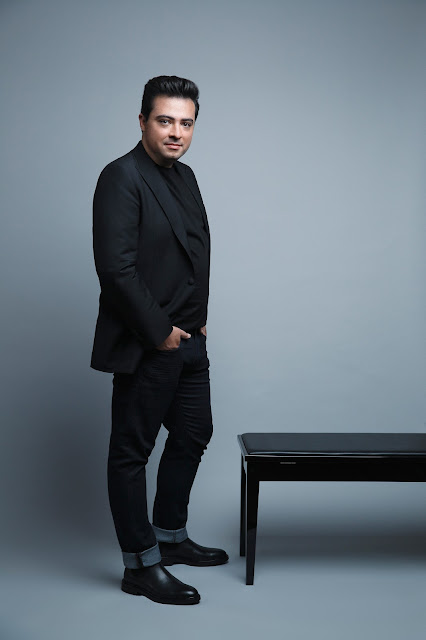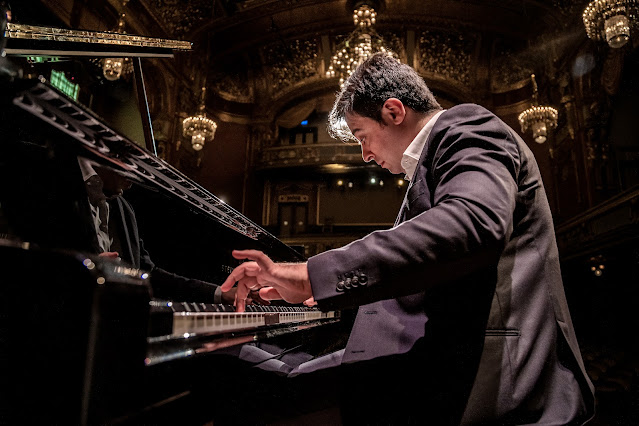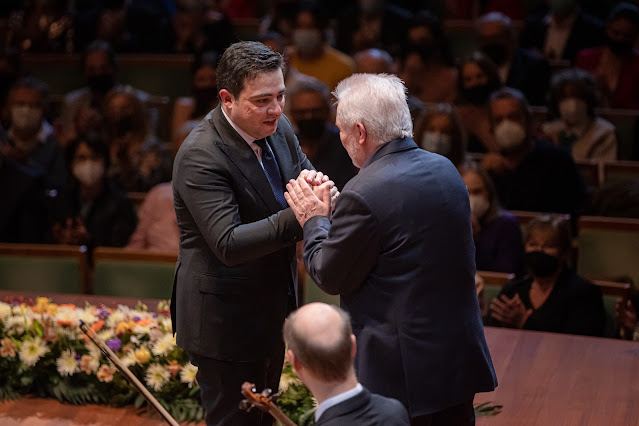 |
| George Cziffra |
 |
| János Balázs (Photo Emmer Laszlo0 |
For János, Cziffra was a totally unique spirit in the 20th century and his style was very different to that of other pianists, classical but always with a style of improvisation and Cziffra's style of pianism comes from the Liszt school. Cziffra was a great grand-pupil of Liszt - at the Franz Liszt Academy, Cziffra studied with Erno Dohnányi (1877-1960) whose teacher was István Thomán (1862-1940), who was a favourite pupil of Franz Liszt.
And János wishes to celebrate the freedom that Cziffra brought to his music, an improvisatory freedom that 19th century performers brought to the performances but which is not so common now. János wants to show this to the public, and the festival seeks to find artists who can perform in this style. János is also celebrating a proud Hungarian tradition of pianism exemplified not just by Cziffra but by such artists as the pianist Annie Fischer (1914-1995).
Whilst Cziffra never played other than from the score, he did so in a spirit and style that was free and full of colours, and totally himself. He wanted to share this style and energy with the public, feeling that it was important that in each concert the audience got something new. He played a lot of jazz, light music and transcriptions, something that was accepted in the Romantic tradition where performers would play whatever they felt inclined to. Nowadays, János sees performing as often being weighted towards perfection, avoiding risk, and he wants his festival to show the passion and style of performing in the Cziffra tradition.
János never met Cziffra, he was six when the great pianist died, but there is a family connection. During the 1950s, when Cziffra was playing in bars and clubs in Budapest, he was friends with János' cellist grandfather. János' father was a jazz pianist, but thanks to his grandfather, who had been given discs by Cziffra, the young János heard Cziffra's recordings.
Aged three or four, János heard recordings of Cziffra playing Liszt's Hungarian Rhapsodies and loved them, and tried to emulate them on the piano. János says that Cziffra is directly responsible for him playing the piano. Cziffra also became something of an idol, a hero because of his World War Two record as a prisoner, and his involvement in pre-1956 Hungarian politics.
Aged 16 or 17, János decided he wanted to give something back, to stop the world forgetting Cziffra, and János gave a concert in the pianist's memory. This became an annual event, finally in 2016 developing into the festival. The festival is dedicated to Cziffra's memory and invites artists who share the great pianists passion, performing classical music, jazz, gypsy music, klezmer and more.
 |
| János Balázs performing at Liszt Academy of Music (Photo Andrea Felvegei) |
The centenary festival, György Cziffra 100, has the support of the Hungarian government and they have been giving 100 concerts in just over a year with over 100 artists and concerts both in Hungary and in other European countries including the UK, France, Germany and Italy. János feels proud that they are able to celebrate Cziffra by joining together in a big festival.
A few days before we spoke, the festival had presented Martha Argerich and Mischa Maisky in concert in Budapest. In November 2021, the festival presented the premiere of Hungarian composer Peter Eötvös' first piano concerto, Cziffra Psodia, with János Balázs as soloist with Orchestre Philharmonique de Radio France, conductor Mikko Franck and the work is also being performed in Paris, Geneva and Moscow.
The Cziffra Foundation has always supported young artists, and the festival has its own young artists programme, presenting concerts for talented but not well-known artists in Hungary and abroad. The regular festival takes place in February each year, but the centenary festival as been running from February 2021 to May 2022, with the regular festival taking two weeks in February 2023.
János recent disc, Improvisart on the Sheva Contemporary label is somewhat an homage to the older composer and the disc includes Liszt and Cziffra transcriptions alongside János' own. The idea of transcription and improvisation was very traditional in the 19th century but in the 20th a lot of pianists rejected the idea. János wants to encourage the style to be re-born.
In concert, János programmes include the music of the great composers but at the end of a recital he performs something of his own, his last chance to demonstrate to the audience what he thinks about music. He emphasises that he does not want to be a composer, he he does want to share his soul, his passion.
 |
| János Balázs with Peter Eötvös at the György Cziffra Festival (Photo Nagy Attila Müpa) |
Coming up he was performances with cellist Alexander Kniazev and violinist Vadim Repin of Brahms, Franck and the Tchaikovsky Piano Trio in Budapest (22/2/2022, see festival website). Further ahead there are the Liszt concertos to look forward to (27/2/2022, see festival website) and in April he will be performing Bartok's Piano Concerto No. 2 with the Concertgebouw Orchestra and Ivan Fischer. And János will be performing Peter Eötvös' Cziffra Psodia in Geneva with Eötvös conducting the Suisse Romande Orchestra (6/4/2022). János will be performing in London with the Royal Philharmonic Orchestra in September.
So there are a lot of notes to learn, but he also has an eight month old daughter (he and his wife's first child) and he wants to spend lots of time with her too, and of course there is the lack of sleep!
Never miss out on future posts by following us
The blog is free, but I'd be delighted if you were to show your appreciation by buying me a coffee.
Elsewhere on this blog
- Mélodies: French song and Czech rarities from two young Czech singers - record review
- Orchestra of the Swan celebrates the centenary of Walton's Façade on SOMM - record review
- In the midst of things: chamber music by Karl Fiorini - record review
- Love Island? Tim Albery at Opera North takes an intense, modern look at Handel's Alcina - opera review
- Femi Elufowoju jr’s imaginative reinvention of Verdi's Rigoletto features some strong, compelling performances - opera review
- Not an additional ornament: as he prepares to direct Handel's Tamerlano, Dionysios Kyropoulos discusses bringing historical stagecraft to the modern stage - interview
- Jonathan Miller's production of Puccini's La bohème is in fine fettle as it returns to the London Coliseum - opera review
- The Flat Consort: Fretwork evoke afternoons in Hereford with composer Matthew Locke performing with friends - record review
- Enchantresses: Sandrine Piau is on vivid form in this recital of arias from Handel's operas from Rinaldo to Alcina - record review
- Robert Max in Bach's six Cello Suites at Conway Hall - concert review
- Love & dissimulation: Alessandro Stradella's opera Amare e fingere explores the 17th centuries fascination with Arcadia - record review
- Expanding her horizons: Lada Valesova on conducting Tchaikovsky's Eugene Onegin at Opera Holland Park this Summer - interview
- Home











No comments:
Post a Comment